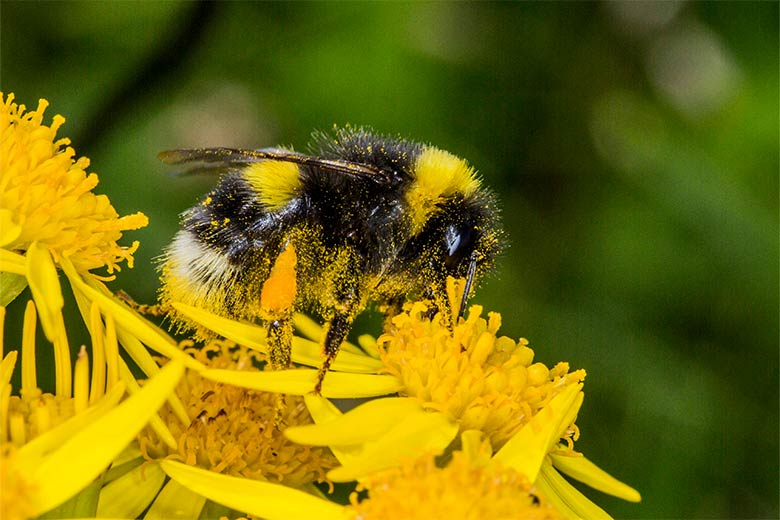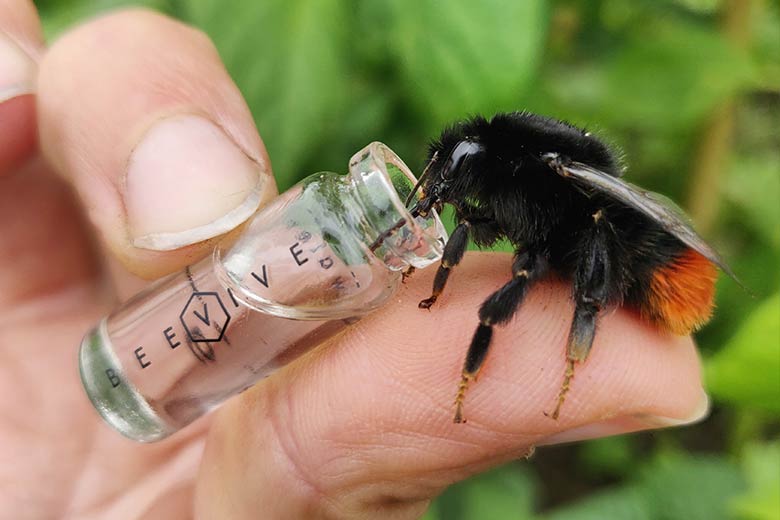Help save the bees this World Bee Day
Bees are a vital part of our ecosystem. They pollinate our food, as well as trees and wildflowers, which helps to support humans and animals. We wouldn’t be able to survive without them, and yet worryingly they are in serious decline.
There are several reasons bees are at risk. Habitat loss is a big problem, as more and more poorly designed developments mean that the places bees call home, like woodland, wildflower meadows and grasslands, are being destroyed. But it’s not just developments that threaten bees’ homes – pesticide use is on the increase in farming in particular, which means bees are being unknowingly poisoned when trying to pollinate.

As well as this, the threat of climate change is another factor in bees’ decline: changes in the seasons mean that flowers aren’t blooming when they usually do, which therefore disrupts when bees are able to feed. Extreme weather events like droughts or storms can prevent them from finding enough food.
Thankfully, all is not lost, as there are many ways we can help to support and ultimately save bees in their time of need. We’ve put a list together of simple ways you can help. Whilst they might seem small, doing just one of these things could make all the difference for bees.
Plant wildflowers
Planting wildflowers is probably the easiest and most effective way to help bees. Rich in nectar, wildflowers provide bees with food throughout the year. Wildflower meadows can provide them with shelter too, and there are lots of wildflower seeds available tailored specifically for bees. Our Best for bees wildflower seeds are easy to grow and brilliant for attracting bees. We also have seeds for Bees and butterflies available, and our Bee-friendly herb seed disc pack, which can be placed outside for bees to enjoy once flowered.
Give them a place to shelter
As habitat loss is a big issue for bees, giving them a place to shelter can really help them out. We have two different bee homes available at RSPB Shop: our Solitary bee home, which has been specifically designed for leafcutter and Red Mason Bees, and our Dewdrop bee biome, for solitary bees and other insects.
Provide water
While it’s easy to forget, bees need water just as much as anyone, to stay hydrated and function properly. Placing a bird bath in your garden is a great way to help not just birds, but bees and other wildlife too. Just remember to add things like rocks to the bath, to ensure bees don’t drown when having a drink. A bird bath like our Aristotle oasis bird bath is great because it has a theatre step system, allowing bees to access the water safely.
Avoid pesticides
Pesticides are the biggest no-no for bees, so it’s best to be a conscious gardener and avoid using them at all. Mammals like Hedgehogs are natural pest-eaters anyway, so there’s no need to use harsh chemicals when tending your garden.
Save a tired bee
Bees are notoriously hard workers, working tirelessly day by day to pollinate flowers and keep the ecosystem in check. It's quite common, therefore, to come across a bee struggling on the ground from time to time, exhausted from all their hard work. The best thing you can do to rescue an exhausted bee is by giving them some sugar water, which is where Beevive bee revival kit comes in. This handy keychain is perfect for on-the-go as it contains a nifty little vial of bee food syrup to give bees an energy-boost. However, please don’t leave bowls of sugar water out and only use this method to help individual lethargic bees.
It’s more important than ever to do our bit for bees. Happy World Bee Day!
